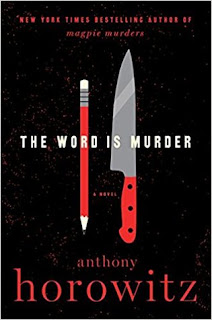"There is nothing new under the sun," wrote Ecclesiastes, a fellow who knew a thing or two about writing, because he also acknowledged that "the making of many books is a weariness of the flesh." Mystery writers can say amen to both, which is why when something even slightly novel appears on the horizon, the publishing world rejoices.
UK author Anthony Horowitz has lately devised an interesting variant on the relationship between detective and amanuensis and has kicked his notably intricate and tricky plotting up a couple of notches with two novels featuring Daniel Hawthorne, a former detective inspector who really does appear to be, like Sherlock Holmes, a consulting detective. In this case, his clients are police departments in need of some extra forensic savvy.
In The Word is Murder, Hawthorne approaches Tony, a TV writer and novelist whose extensive credits mirror Anthony Horowitz's own, about writing up one of his cases. The Tony version of Anthony Horowitz initially declines, citing his current immersion in Foyles War, the anticipated displeasure of his agent, and various other book commitments.
Fortunately for fans of traditional mysteries, 'Tony' as Hawthorne always calls him, is intrigued enough to accompany the ex-cop to a real life crime scene and eventually to draft a first chapter that Hawthorne finds thoroughly unsatisfactory. The author has a great deal of fun with the difference between fictional and real crime and with the conflict between Tony's natural desire to write something lively and interesting and Hawthorne's equally natural desire for strict, even pedantic accuracy. He really is a detective for whom no detail is too small to notice.
Initially, the chances of this partnership going the distance seem slim. There will be no cozy suppers of the sort that Mrs. Hudson provides for Holmes and Watson, nor any personal errands such as Archie runs for Nero Wolfe. Hawthorne guards his private life so strictly that it is momentous when Tony discovers his address and a major triumph when he at last enters Hawthorne's flat.
Perhaps this is just as well. Hawthorne's great gifts are observation and analysis combined with a ruthless absorption in a case. Social graces, empathy, and rapport are not really in his skill set, much to Tony's frequent embarrassment and occasional distress. He really does not want to risk his reputation writing up a fellow who can be rude, even bigoted.
Still, faced with a tricky crime, Hawthorne is the man for the job, and if 'Tony' is often stymied, prone to incorrect solutions and, worse, to foolish personal risks, author Anthony Horowitz keeps his wits about him. He is clearly a big fan both of Arthur Conan Doyle and Agatha Christie and in the first two Hawthorne books, The Word is Murder and The Sentence is Death, he combines all the misdirection and red herrings of the traditional genre with a pair of thoroughly modern sleuths and some lively insights into contemporary UK publishing and TV.
The Hawthorne novels are, to my mind, superior to his other adult series, although it, too, is skillful entertainment. The Susan Ryland series features books within books, as one of the fictional Alan Conway's Atticus Pund mysteries appears at full length within both The Magpie Murders and The Moonflower Murders.
Besides providing a second helping of traditional detection, the Pund novels serve to entangle editor Ryland in crimes that definitely reflect the same Golden Age of Detective Fiction sensibility. They are marvelous from the point of view of plotting, but I don't find Ryland as engaging a character as either well-meaning and rather harried Tony or sullen, difficult, but eventually surprising, Hawthorne.
My Madame Selina mystery stories about a post Civil War spiritualist medium in New York City have been issued as an ebook on Kindle. Ten mysteries and a novella featuring Madame Selina and her useful young assistant Nip Thompkins are available on Amazon.


I agree that the Hawthorne books are his best. I am currently reading the Moonflower Murders, but am looking forward to A Line to Kill, the new (third) Hawthorne book. Country singer Kinky Friedman wrote a fine series of mysteries about a country singer named Kinky Friedman. I don't know how many other authors put themselves into the books in quite that way?
ReplyDeleteJanice, you keep me busy with your often unique recommendations. I always enjoy them.
ReplyDeleteRob, I didn't know Friedman wrote fiction! Well, not counting politics.
I love the Hawthorne and Ryland series. I'm glad you've shared them with SleuthSayers readers, Janice.
ReplyDelete